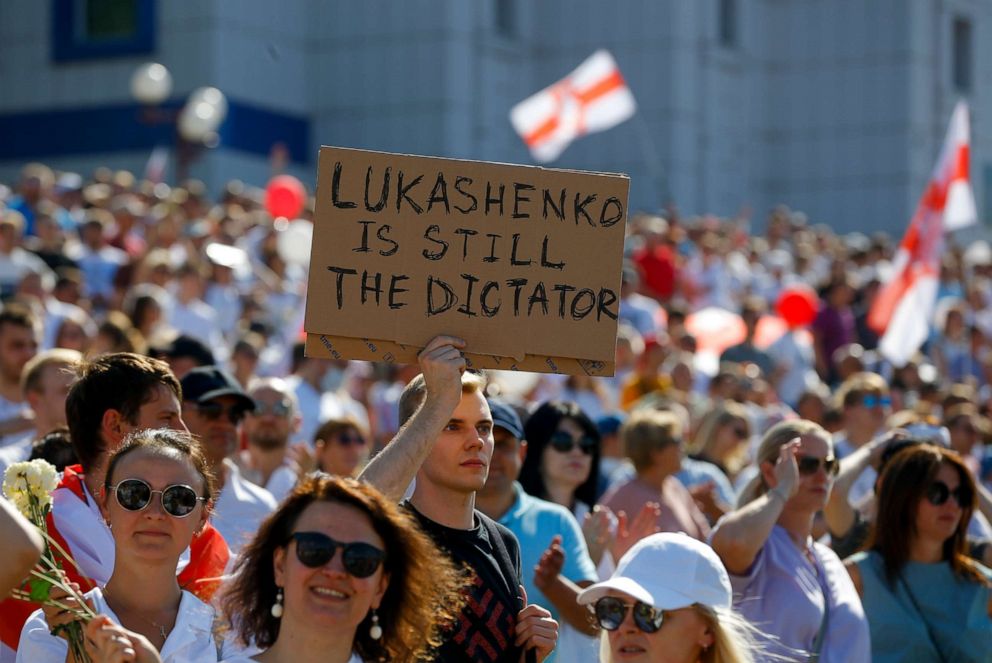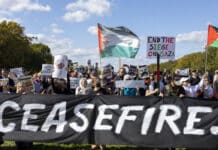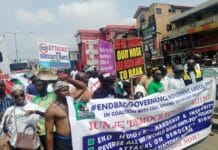Today strikes have continued to spread. The coming days will decide the question one way or another.
Rob Jones, Socialist Alternative (ISA Russia)
Today strikes have continued to spread. Lukashenko speaking at a Minsk factory stated that “We have had our election. Only over my dead body will another election be held”. But the decision is no longer his to make — the coming days will decide the question one way or another.
With the beautiful ironic humour that usually accompanies mass uprisings and revolutions, a video has appeared of Alexandr Lukashenko driving a salon car being chased by a huge mining dump truck, clearly about to crush the car, symbolizing how quickly the mass movement is catching up to crush him and his rule. The workers from the ‘Belaz’ factory that makes the dump truck are amongst those that have walked out on strike.
Over the week-end the balance of forces was measured across the country. In Minsk, Lukashenko gathered his forces. Convoys of coaches travelled from the different regions and yet all he could gather was, according to the highest estimate, ten thousand people. Even some of those who spoke said it was stretching the imagination to think he had won 80% of the votes.
In contrast, in every major city across the country tens of thousands gathered in opposition. In Minsk alone, up to 200,000 people gathered in the city centre.
In a number of cities, the local administrations have started flying the red and white flag of the opposition. The crowd started with good humour, with chants such as “Keep striking till the end”, “You’re the executioner of your own people — resign” or “Granddad — keep taking the tablets”. The demand went up for a “Tribunal”, which led to an exchange: “I’d shoot him straight away”, said one woman. “No-no. Shooting is too easy. Only a tribunal.” said another. “No, I’m more humane” said the first. “I would shoot him”.
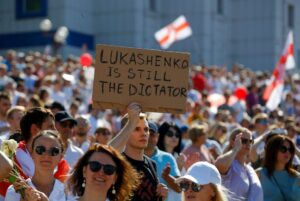
Strikes and now a general strike
A huge boost to the protests took place on Thursday and Friday when over a hundred factories and workplaces came out on strike. From the big industrial giants which employ thousands, and sometimes tens of thousands of workers to hospitals and the IT sector. Even the state broadcasting company has now switched to the side of the opposition. This followed a speech by Lukashenko in which he accused all demonstrators of being ‘sheep’ who work for foreign powers and ‘people with a criminal past who are now unemployed’.
These ignorant and provocative statements just poured oil onto the flames. In response workers from the giant Minsk Tractor Factory drew up a giant banner reading “We’re not sheep, not cattle, not non-persons. We are the workers of the MTF. We are not 20 but 16,000” and on Friday marched behind it en-masse to the Parliament building in the city centre. On arrival, the OMON riot police surrounding the building lowered their shields.
Amongst the first to walk out to protest were medical workers. Some held placards saying “Patient #1 is doomed!” Reportedly, in the first days when the police were reporting to the hospitals for treatment, they were given diagnoses too serious to prevent them going back out onto the streets. The medics joined the increasing number of industrial plants joining the strike. This usually took the form of a mass meeting in the plant at which workers were asked if they had voted for Lukashenko — no-one responded, then a wave of hands shot up when the alternative was offered — a vote for Tikhonovskaya. IT workers who usually work in smaller workplaces joined up on the streets to show their solidarity.
The nature of this uprising changed during the week. At the start, there were mass demonstrations across the country which usually ended up being attacked by the riot police. Over 6,000 were arrested and those who have since been released talk of huge overcrowding in the cells and in many cases torture and threats of rape against female prisoners by the police. As news of state violence spread, overnight in the Minsk suburbs, which is where the working class tend to live, the chants went up from flats — ‘skhodi, skhodi’ — resign, resign.
Once the strikes spread, the police were no longer confident they could control the situation and the National Head of the Police announced that all those detained were to be released. As the prisoners came out, they related what happened while they were detained, further fueling the anger. On Sunday, thousands turned out to the funeral of Aleksandr Taraikovsky, who died earlier in the week. Police claimed that an explosive device he was about to throw at them blew up — but video evidence demonstrates that he had nothing at all in his hands.
Lack of real leadership
Another factor that changed the mood of the protests was the direct involvement of women who organized human chains across the country, often with young children in tow to demand an end to the violence. A certain role in this was played by Tikhonovskaya, who allied with Veronika Tsepkalo and Maria Kolesnikova, wife and chief of staff respectively of the other disqualified candidates. This has been high-lighted as a factor in the western press, but the very day that the women started to protest in an organized way, was the same day as Tikhonovskaya asked people to stop protesting.
By Friday, mass protests of school students developed in which they refused to accept their school certificates, posting placards saying ‘you have killed people’ and saying that exam commissions ‘should be embarrassed of their actions’. Teachers are often seen as conduits for state propaganda. Teachers themselves have now started to join the protests in an organized way. The way in which the whole situation has developed together with the mass walk-outs across the country has meant the state has had to hold back from its brutality for fear of provoking even more determined opposition.
Lukashenko and his regime blame all the trouble on ‘foreign agitators’. Where from is not always clear but he sometimes claims that agitators have arrived from Ukraine, Poland and Russia, the three large countries surrounding Belarus. While, of course, denying Russian involvement, the Kremlin blames Western influences. One after another, Stalinist and former Stalinist groups have been rushing to support Lukashenko, who for some reason they see as a bulwark of ‘Soviet rule’. On Sunday, not surprisingly, those who came out to demonstrate in support of Lukashenko included those with communist party and Russian communist party flags.
From spontaneity to organanisation
But the truth is that there has been a very large degree of spontaneity in the opposition protests. Those parties that had positioned themselves as opposition parties over previous years — mainly of a right social democratic and mild nationalist colour — absconded from the struggle as soon as Covid 19 hit the country. The accidental figure of Svetlana Tikhonskaya at the start of the week called for negotiations with Lukashenko. She was invited to a meeting at the Electoral commissions office from which she never returned. It is apparent she was threatened there — she later turned up in Lithuania, saying that things had gone too far and she had to make a priority of her children. Now she has announced she is prepared to take over as “national leader” until new elections.
Nor in Belarus is there a significant level of trade union organization. As in other former Soviet republics, in many factories the former state trade union still exists but is completely loyal to Lukashenko. It warns of the economic consequences for workers if the protests continue. The small independent unions that were built mainly in the early years after 1997–8 have lost influence and their official statement on events calls on workers to organize a petition. Individual or groups of activists from this union have however been involved in organizing the protests.
If anyone can be seen to ‘organise them’ it is the economic crisis, Covid-19 and the election manipulation, and of course the provocative statements made by Lukashenko himself.
Just yesterday, he claimed that those who had come out on strike had been paid to do so and should be sacked.
Demands
The spontaneous nature of the protests accounts for why there are no political banners and very few slogans carried by demonstrators. Sometimes the Red and White flag which was the symbol of Belarus in the period 1991–4 is used. This was banned when Lukashenko came to power and restored some Soviet period symbols. Often the chant ‘Zhivi Belarus’ — Viva Belarus can be heard.
When demands are raised, they usually consist of the need for new elections, an end to the police violence and release of political prisoners. Now for the first time the call for a ‘tribunal’ has gone up. Perhaps the most advanced are those proposed by the strike committee at the Minsk Tractor Factory who demand the reform of the police and military structures and the sacking of all those involved in violence against demonstrators, a change of government, the reform of the electoral commission and the full rehabilitation of political prisoners. Now that strike committees have begun to appear, demands such as an end to contract working, the abolition of Decree №3 (the so-called ‘law against parasites’ to tax the unemployed) and reverse the pension reforms are being heard.
These are in conflict with those now proposed by the opposition troika, and European powers who are clearly looking for a compromise with the regime. The former propose setting up a coordinating committee to ensure the transfer of power, whilst Valery Tsepkalo, one of the disallowed candidates even suggests that Lukashenko should be granted immunity from prosecution and stay in power for six months as new ‘honest’ elections are held, in which Lukashenko himself could stand again.
Now that the protest has taken on the form of a workers uprising, the liberal opposition are in a panic to find a way out.
The EU in turn is not even demanding that Lukashenko should resign, proposing instead setting up a “round table of national unity”.
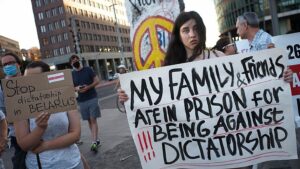
Russia’s role
At the same time Lukashenko is clearly looking to Putin for support. Following a telephone conversation yesterday Lukashenko reported that Putin was ready to give support, clearly implying this meant military support. He warned demonstrators not to allow themselves to become “cannon fodder”, clearly implying he would use extreme measures.
Putin however made clear that the only support he was prepared to offer at this stage was if there was a military intervention from Poland or another EU country under the terms of the collective security agreement. This makes the actions of Tsepkalo, who has been meeting with US senators and EU representatives and is trying to initiate a hearing on Belarus in the US Congress particularly unwelcome, as such interference by Western imperialist powers could strengthen the excuse for Russia to intervene.
Whilst the example of the possible overthrow of Lukashenko sets a dangerous precedent for Russia, an open intervention could be even more dangerous as unrest is already growing within Russia following six weeks of mass protests in the Far Eastern city of Khabarovsk and now big protests in the Urals republic of Bashkiria over ecological issues. In both cases banners are already appearing saying “From Khabarovsk to Brest, there’s no place for dictatorship” — it rhymes in Russian! The Russian press talk, not just of the increasing politicization of these processes, but their ‘Belarusisation’. Today there are reports of columns of Russian National guards approaching the border with Belarus, but these are probably to police the border in the event of Belarusian events going out of control rather than to cross the border itself.
What is now needed
The ISA stands in full solidarity with the demonstrations and strikes in Belarus. We have no confidence that bankers and former diplomats, who were themselves part of the Lukashenko regime for many years should determine the fate of the country. In particular, both Western imperialist powers and Russia should keep out of Belarusian affairs.
The strikes should be extended and run by elected strike committees until Lukashenko goes and all political prisoners are released. The strike committees should be linked up and include student and resident representatives to organize a revolutionary constituent assembly to decide how the country should be run in the interests of the working class.
In the past days the opposition ‘troika’ around Tikhonovskaya have proposed organising a transitional Coordination committee and inviting workers to send representatives to oversee the transition of power. But this is not the same as a constituent assembly. Changing who heads the system will not change the system itself. In fighting for political change, the economic situation needs to be changed — Decree No 3 and the contract system should be immediately repealed and the pension reforms reversed. The state budget changed to finance education and health care instead of the police and state bureaucracy. To ensure this, a workers’ political party is clearly needed that can form the government, it would be able to ensure that the economy is run under democratic workers control and establish a socialist government as part of a socialist federation of democratic socialist states.
End game being played out
At the time of writing the balance of forces is being measured across the country. Yesterday, in Minsk alone, the opposition gathered ten times more than Lukashenko could muster — and there were also huge protests in other cities.
Today strikes have continued to spread. The Internet is once again being shut off. Lukashenko himself decided to appear at the Minsk ‘Volat’ factory flying there by helicopter rather than driving. Workers from nearby factories marched on the plant chanting ‘resign, resign’. Notably Lukashenko when speaking stated that “We have had our election. Only over my dead body will another election be held”. It is clear however, that the decision is no longer his to make — the coming days will decide the question one way or another.

